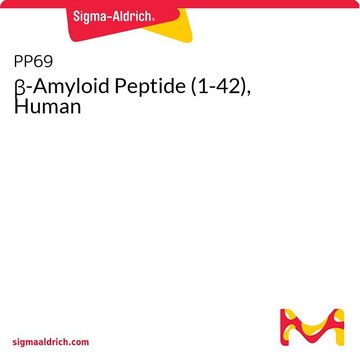SCP0002
Acetyl-Amyloid β 25-35
Iniciar sesiónpara Ver la Fijación de precios por contrato y de la organización
About This Item
Fórmula empírica (notación de Hill):
C47H83N13O15S1
Peso molecular:
1102.31
UNSPSC Code:
12352202
NACRES:
NA.32
Productos recomendados
Amino Acid Sequence
Ac-Gly-Ser-Asn-Lys-Gly-Ala-Ile-Ile-Gly-Leu-Met
General description
Amyloid-β (Aβ) peptides are a major component of the senile plaques characteristic of the Alzheimer brain. It is a type- I transmembrane protein. The amyloid β precursor protein is cleaved to amyloid peptides 36-43 amino acids in length. Aβ (25-35) represents the region that aggregates during plaque formation and is a functional domain implicated in both neurotrophic and neurotoxic effects. The gene encoding amyloid-β is localized on human chromosome 21. Acetylation may improve stability in in vitro and in vivo assays.
Application
Acetyl-Amyloid β 25-35 has been used to prepare rat models with Alzheimer′s disease.
Storage Class
11 - Combustible Solids
wgk_germany
WGK 3
flash_point_f
Not applicable
flash_point_c
Not applicable
Elija entre una de las versiones más recientes:
Certificados de análisis (COA)
Lot/Batch Number
¿No ve la versión correcta?
Si necesita una versión concreta, puede buscar un certificado específico por el número de lote.
¿Ya tiene este producto?
Encuentre la documentación para los productos que ha comprado recientemente en la Biblioteca de documentos.
Monomeric Amyloid Beta Peptide in Hexafluoroisopropanol Detected by Small Angle Neutron Scattering.
Zhang-Haagen B
PLoS ONE, 11(2), e0150267-e0150267 (2016)
Conformational Dynamics of Specific A? Oligomers Govern Their Ability To Replicate and Induce Neuronal Apoptosis.
Dean DN
Biochemistry, 55(15), 2238-2250 (2016)
Effect of yizhitongxuan decoction on learning and memory ability, Gaq/11 expression and Na(+)-K(+)-ATP enzyme activity in rat models of Alzheimer's disease.
Teng J
Journal of Traditional Chinese Medicine = Chung i Tsa Chih Ying Wen Pan / Sponsored by All-China Association of Traditional Chinese Medicine, Academy of Traditional Chinese Medicine, 34(4), 470-476 (2014)
Yili Wu et al.
Scientific reports, 6, 22460-22460 (2016-03-05)
Down syndrome (DS), caused by trisomy of chromosome 21, is one of the most common genetic disorders. Patients with DS display growth retardation and inevitably develop characteristic Alzheimer's disease (AD) neuropathology, including neurofibrillary tangles and neuritic plaques. The expression of
Nuestro equipo de científicos tiene experiencia en todas las áreas de investigación: Ciencias de la vida, Ciencia de los materiales, Síntesis química, Cromatografía, Analítica y muchas otras.
Póngase en contacto con el Servicio técnico

![[Ala28]-Amyloid β 25-35 ≥95% (HPLC)](/deepweb/assets/sigmaaldrich/product/images/306/938/dd9f7c72-cfca-4ea3-8e10-a7a2a7994639/640/dd9f7c72-cfca-4ea3-8e10-a7a2a7994639.jpg)

![[Gly35]-Amyloid β 25-35 ≥95% (HPLC)](/deepweb/assets/sigmaaldrich/product/images/154/487/d30c2077-f807-4989-855d-92ec012c4452/640/d30c2077-f807-4989-855d-92ec012c4452.jpg)




